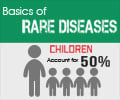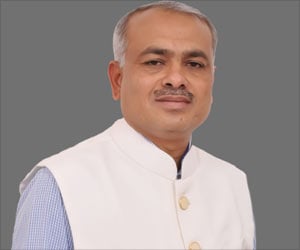The 10th annual Global Rare Disease Day is being celebrated each year on the last day of February. This year it is found to focus on the key theme being “Research.”
- Global Rare Disease Day is held annually each year on the last day of February
- This is a day to raise awareness about rare diseases and advocate for this ignored cause in the health discourse
- Patient communities, parents and friends, medical and research fraternity all over the world come together to advocate for better access to drugs, treatment, research and clinical trials
Rare Diseases in India
There are 7000 rare diseases and counting. India has a rare disease count of around 70 million which makes it 7% of the total population. In India, children born with rare diseases do not live beyond the age of 5 because of diagnostic delays and lack of access to drugs and therapeutics. Lack of diagnostics means it takes an average of 7-8 years to diagnose a rare disease in India. Such critical delays lead to permanent damages and impairment thereby impacting the life quality of children and adults with rare diseases. Rare diseases are totally excluded from the public health discourse with very few public health centers and hospitals equipped to deal with the complex diagnosis and treatment. Most rare diseases require drugs which are often “orphan drugs” priced at high costs thereby making it unaffordable to the majority. Mortality rates in the rare disease community are high with untimely deaths among children and adults.Significantly, this year’s theme focuses on the importance of research to tacklie the challenges of rare diseases.
2017 Theme: “With research, possibilities are limitless”
Research is the key to gaining a deeper molecular, genetic as well as psychosocial understanding into the gamut of issues faced by rare disease communities. Research activities are extremely important and critical for rare disease communities in not only discovering and developing drugs and therapeutics but also towards finding futuristic curative therapies.The reality of rare disease is often the total absence of any available diagnostic for a set of symptoms. Many rare diseases do not yet have a name and little understanding about its biochemistry and the way it affects individuals. People with unknown rare diseases suffer immensely as doctors, experts and systems are not yet equipped to handle their cases. The reality of “no diagnosis, no known treatment and no cure available” is devastating to patients, families and communities. Patients often run from pillar to post to obtain information and some direction towards diagnosis. This constant state of uncertainty and inability of our health systems to deal with unknown rare diseases affects the patient’s overall life quality. The impetus to research can clearly lead to the identification of hitherto unknown diseases along with a biological understanding and diagnostic framework. This paves the way for further research into finding immediate therapeutics to alleviate or control the symptoms and future curatives. Innovative drug development often proceeds from basic research on rare diseases.
To further the goal of research, it is critical to also understand the role of patients and patient communities in research. This is essential to avoid power asymmetries and involve stakeholders in key decision-making processes which impact their lives. Across the globe, patient advocacy organizations are now taking on a greater responsibility for pushing research forward in more than one way:
- Patients and patient organizations are now the greatest advocates of research across the spectrum of rare diseases
- Funds for research often come from patient communities through fund raising
- Patient groups are often key partners in major research projects
- Patients often play a role in designing and participating in clinical trials
References:
- World RARE Disease Day 2017 - (https://globalgenes.org/world-rare-disease-day/)
- 28th February: Rare Disease Day 2017 is here! - (https://www.enerca.org/activities-news/news/149/28th-february-rare-disease-day-2017-is-here)
- BREAKING NEWS: 2017 Rare Disease Day theme is announced - (http://www.rarediseaseday.org/page/news/2017-theme-research)











